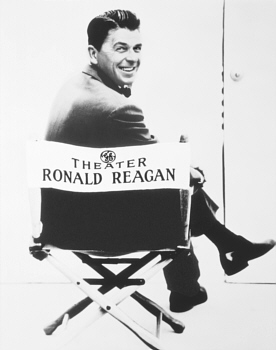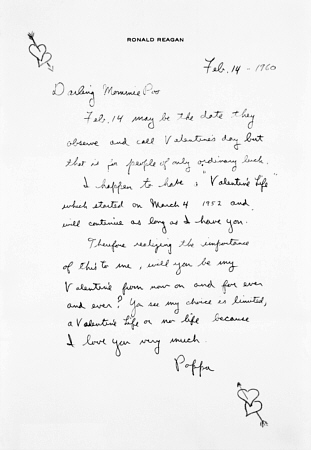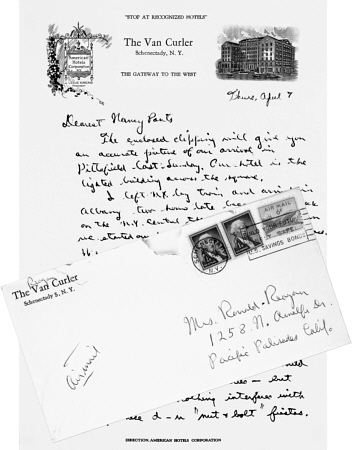I Love You, Ronnie (6 page)
The frustrations of being far from home and unhappy in his work were clearly weighing heavily upon Ronnie when he wrote the next letter. It was rare for him to sound so negative.

An Easter telegram from Ronnie to Patti and me.
Sat. Jul. 17 [1954]
Dearest Nancy Poo
This has been the longest week in world history. Already I walk out the door and don’t even bother to look at the scenery. The only scenery I want to see is a nursery window framing two faces when I jingle the “Bermuda Bell.”
I don’t know how the picture is going. We started in confusion and have managed to develop that characteristic to an unusual degree. B.B. is still defending his script, I’m still feeding suggestions to A.D. and those two then huddle and argue. Right now I’m waiting to go to work and the scheduled scene is one of those that needs changing the most. I’m quite interested to see what happens. In the meantime, what the h-l do I learn? B.S. just continues to go her merry way in the exclusive
company of two hairdressers and her maid. I wonder what picture she’s making.

Having started in this somewhat downbeat vein—shall I continue? Well, the natives around here have a sort of “mid-1930’s” approach to movie making. Everything has a price and we constitute fair game with a long open season. Let’s start with the horses—at least that is what they are called. These scrawny goats were flushed out of the brush the day we arrived and if they ever had any training, they have short memories. The local cowhands claim they have produced their best—what they mean is, the best they’ll let us use.Yesterday I did a scene mounted on my faded Palomino (which is the size of one of our Yearlings); the two locals playing extras with me were mounted on their own horses—both
registered thoroughbreds
.
When we do a scene the assistants yell “quiet” in a pleading tone entirely foreign to their usual manner. This is because the “locals” are restless and may quit and go home now that the novelty has worn off.
This, incidentally, is my first crack at picture making since the big switch to TV film work in Hollywood and it bears out everything we’ve ever said. First of all—getting a crew was a case of rounding up who you could find. The industry, as we have so often said, literally forced our technicians to seek work in TV and now we reap the harvest. Ben said there was a scramble to get enough guys for this crew—with no thought whatsoever of picking and choosing. Let’s just put it this way—they and these horses have a lot in common.
Well now that is enough—any more of this inspirational literature and you’ll envy me my stay in this pastoral paradise.
Your letter and Patti’s enclosure arrived yesterday (Fri.) so you have some idea of the mail service. I’m lonesome and miss you both until it hurts. I still can’t give you an exact date on homecoming. If I asked one of these boys for that information I wouldn’t be able to coax them down out of the hills for hours—they wear a worn and harried look at this point. Let’s just keep our fingers crossed and hope it is soon.
I love you so very much and miss you every minute. Be very careful of you.
Ronnie

Ronnie as host of
General Electric Theater.
R
onnie hosted
General Electric Theater
from the fall of 1954 until the spring of 1962. During that time, our life together was lived in the happy moments stolen away from the long stretches when Ronnie was out on the road. He was away so much; I once figured out that if I added up all his time traveling, it came to almost two years—two years out of the eight he spent working for G.E.
I remember the shock the first time Ronnie went away on tour, because he was away for so long! Two months! At the beginning, I took Patti and went to see my family in Chicago. The time apart seemed to drag on and on. Ronnie and I were both so unhappy that after that tour, we never allowed ourselves to be separated for that long again. Ronnie told G.E. he simply could not go away for such an extended period, and he was able to arrange a new travel schedule so that he never had to leave home for more than two weeks at a time.
Even during the presidency, the longest we were ever apart was a week. That was when I went to London in July 1981 for the wedding of Prince Charles and Lady Diana. It was a hard separation, coming less than four months after Ronnie was shot. When the doctors told me they thought it was too early for him to travel, I’d originally said I wouldn’t go to the wedding, either. But Ronnie insisted. He felt that after the shooting, I needed a change of scene. He was undoubtedly right—and the royal wedding was a treat. But I remember finding it very strange to be there on my own. In fact, I am never really happy, or entirely comfortable, unless Ronnie is nearby.
Ronnie has always been the same way, and so in the G.E. years, when he found himself in strange hotel rooms across America, he wrote to me of his loneliness.
ATLANTA BILTMORE
THE SOUTH’S SUPREME HOTEL
Sunday [March 20, 1955]
My Darling
Here it is—our day and if we were home we’d have a fire and “funnies” and we’d hate anyone who called or dropped in.
As it is I’m sitting here on the 6
th
floor beside a phoney fireplace looking out at a grey wet sky and listening to a radio play music not intended for one person alone.
Nevertheless I wouldn’t trade the way I feel for the loneliness of those days when one place was like another and it didn’t matter how long I stayed away. With all the “missing you” there is still such a wonderful warmth in the lonliness like looking forward to a bright warm room. No matter how dark & cold it is at the moment—you know the room is there and waiting.
Of course when I say “you” anymore I’m talking a package deal—you and the two & a half year old you. Time goes so slowly and I’m such a coward when you are out of sight—so afraid something will go wrong if I’m not there to take care of you, so be very careful.
It’s time to move on to the next town now and every move is a step toward home and you. I love you so very much I don’t even mind that life made me wait so long to find you. The waiting only made the finding sweeter.
When you get this we will be almost halfway through the lonely stretch.
I love you
Ronnie
Ronnie and I had a ritual, which began before we were married, for when he’d go away to film on location. On the day he was leaving, I would go by his apartment to pick him up and take him to the railroad station. As he finished his packing (he always, even in the White House, did his own packing; he liked to know just what he was bringing and where his things were), I would slip little notes and jelly beans in with the clothes in his suitcase. I’d drive him to the station, and I’d stay on the train until the very last minute. Then I’d get off and drive home feeling very lonely and very sad, and I’d knit him socks.
By the time we were married and Ronnie was traveling for G.E., I’d pretty well given up on knitting socks, but the rest of our routine was the same. Ronnie would leave California in the late afternoon, take the Super Chief train all the next day and night to Chicago, then take the Twentieth Century to New York. He’d visit plants, make speeches, shake hands, tape episodes of
General Electric Theater,
and then begin the long train ride back. He was mostly unreachable while he was on the train, but when it stopped, as it always did, in Albuquerque, New Mexico, he’d be sure to hop off and run into the Western Union office in the station. Each time he passed through there, whether heading east or going west, he’d send me a telegram:
POWDER DOWN YOUR LIPSTICK. I AM ON THE DOWNHILL SIDE OF ALBUQUERQUE. I LOVE YOU.
DID YOU EVER GET THE FEELING YOU’D BEEN SOMEWHERE BEFORE? I AM GOING IN A CIRCLE. I AM ALSO IN LOVE . . .
PRESIDENTIAL TRAIN ON SCHEDULE. DON’T FIRE ANY SALUTES. I’M ABDICATING . . .


A Valentine’s Day letter, from 1960.
